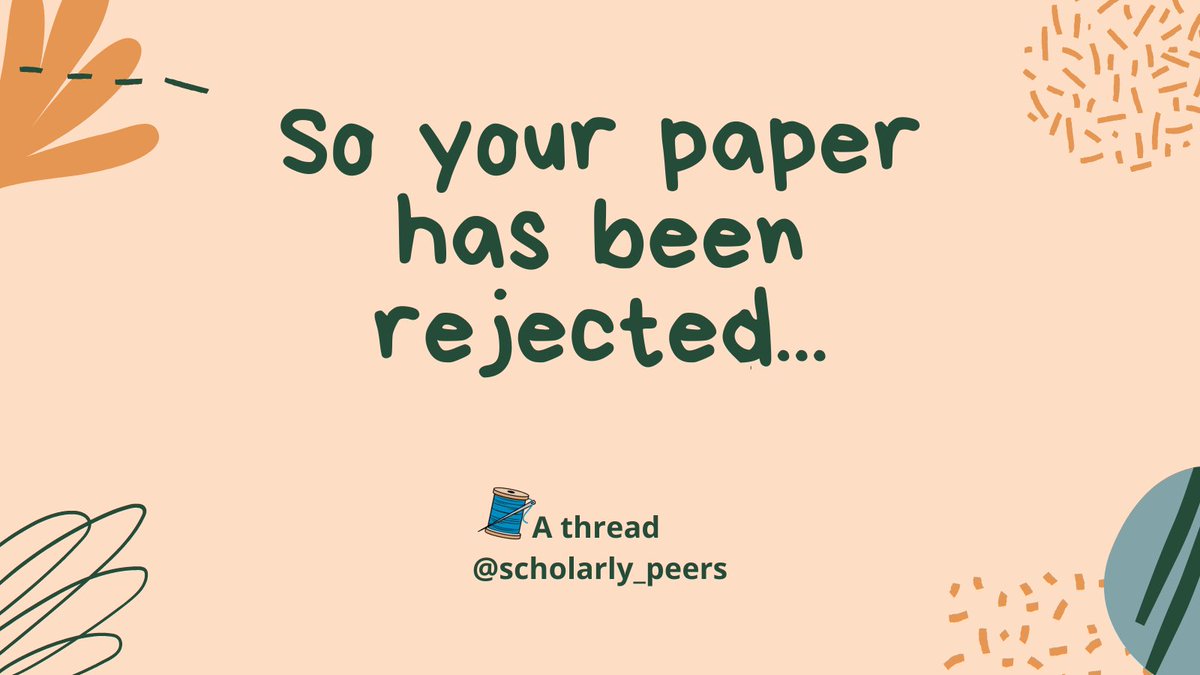
It’s never easy to have a paper rejected after going through #PeerReview. In this thread we offer some advice to help you move on and move up. 👆😀
#AcademicChatter #AcademicTwitter #ecrchat #phdlife
#AcademicChatter #AcademicTwitter #ecrchat #phdlife

Your paper was rejected? Sorry to hear that! It’s certainly not the outcome you expected after putting in so much time and energy. It’s common and totally normal to feel a range of negative emotions.
😢☹️😡😲🤯😭🤨
😢☹️😡😲🤯😭🤨
It’s important to deal with these emotions first. Step away from the paper for a little while. Work on a different project. Vent to a trusted colleague. Do something that makes you happy - go for a swim, watch BBC comedies, eat ice cream (at least that’s what I do).
It may help you to know that rejections are VERY common, but unfortunately “the unabashedly messy aspects of the research process are often hidden” (Clark et al., 2007).
👉The messy process of research: dilemmas, process, and critique files.eric.ed.gov/fulltext/EJ842…
👉The messy process of research: dilemmas, process, and critique files.eric.ed.gov/fulltext/EJ842…
Fortunately, scholars are being more and more open about the setbacks and failures that occur behind the scenes. For example, check out this awesome ‘wall of rejections’,
nickhop.wordpress.com/2017/06/21/my-…
nickhop.wordpress.com/2017/06/21/my-…
and this amazing skirt made from (just some of) the rejection letters received during doctoral candidature.
washingtonpost.com/lifestyle/2019…
washingtonpost.com/lifestyle/2019…
And did you know… “papers published after having first been rejected elsewhere receive significantly more citations on average than ones accepted on first submission”. So that's a bonus!
nature.com/news/rejection…
nature.com/news/rejection…
As much as it can sting, it’s helpful if we try to reframe rejection within the publishing journey not as a dead-end, but as a stop along the way - a chance to refuel and make some improvements, before moving forward again.
A lovely example of reframing rejection in peer review
https://twitter.com/realKaylaHuber/status/1353519810777391106
But eventually we do need to get back to our paper. Set aside some time and look through each of the comments just as you would for major revisions. Think about what suggestions would improve the paper, and for others, what's your rebuttal?
Consider the reviewer’s perspective. They may have strong knowledge of the topic (or not), or they may have misconceptions that need addressing. A reviewer is also a potential reader, so their comments bring insights into how others may view your work.
Unfortunately, some comments can be rude, aggressive, irrelevant. These comments shouldn’t even be forwarded to you, but remember that they say nothing about you or your paper; they only tell us about the reviewer, and can be put in the🗑️
doi.org/10.1007/s00264…
doi.org/10.1007/s00264…
Before you start making any changes, it’s important to first decide your next journal. After all, a review is conducted for a particular journal. Some comments may become less relevant.
Many publishers have online resources to help with journal selection, and there may be blog posts or papers that list and evaluate journals for your discipline. However, I often start with the reference list, if there are journals that I've cited often, that's a good sign.
Once you have decided on a new journal, start making the changes you feel are needed to strengthen the paper. You might run more analyses, you might add more literature, you might reorganise your discussion.
Whatever you do, don’t send your paper without making any changes at all - its a small world and you may get the same reviewer!
As you are preparing your paper, keep in mind the audience, tone, and style of the new journal. The main reason for desk reject is lack of ‘journal fit', so invest some time in making sure your paper fits (and that you show this clearly and explicitly)
doi.org/10.1002/rcm.77…
doi.org/10.1002/rcm.77…
Once you submit the new and improved paper, it’s time to play the waiting game again. Hopefully there will be a more positive outcome this time, but if not, we just continue the cycle again. and again. and again.
(My record is 6).
(My record is 6).
Finally, not if, but when your paper is published, celebrate your success! Share it widely and proudly.
@threadreaderapp unroll
• • •
Missing some Tweet in this thread? You can try to
force a refresh


